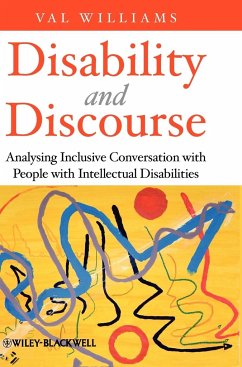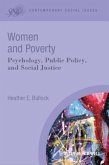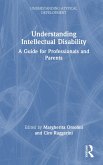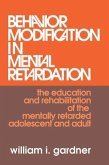For people with intellectual disabilities, effective communication presents a special set of challenges. Despite moves towards 'personalization' in social care, large gaps exist between policy rhetoric and practice. How can we support people with intellectual disabilities on a day-to-day basis in ways that increase their power and control? What does effective participation mean in the real world? Disability and Discourse helps to bridge the actual and perceived differences that exist between people with and without intellectual disabilities. By analysing 'real life' encounters between people with intellectual disabilities and those who work with them, Val Williams provides illuminating insight into the subtle ways in which people are treated in routine conversations. Her original research identifies empowering practices, and reveals the ways in which individual voices are linked to a 'collective voice'. Situations are also explored in which people with intellectual disabilities are empowered to have a voice in their own affairs, in policy-making, and in research. At once illustrating the practical value of Conversation Analysis and increasing its scope to influence practice, Disability and Discourse offers a powerful voice for people with intellectual disabilities.
Hinweis: Dieser Artikel kann nur an eine deutsche Lieferadresse ausgeliefert werden.
Hinweis: Dieser Artikel kann nur an eine deutsche Lieferadresse ausgeliefert werden.
"This thought-provoking text is aimed at practitioners,those who engage in everyday conversation with individuals withintellectual disabilities and researchers who employ conversationanalysis (CA). This book reminds us that these individualsand their support workers can benefit from engaging in more mindfuland reflective practice with regard to everydaydiscourse." (British Journal of LearningDisabilities, 7 August 2013)
'An exciting and innovatory book, rooted in an informedawareness and concern for the interests and rights of the subjectsof study, through a focused analysis of how conversation andparticipation is realised and maintained in everyday contexts.Carefully conceived, and fundamentally important.'
--Len Barton, Emeritus Professor of InclusiveEducation, University of London, UK
'The first book-length account of working with people withintellectual disabilities, at the fine grain of interactionaldetail. The distinguishing feature is the reliance not onsecond-hand data or observational anecdote, but on rigorousanalysis of what actually happens. This ought to have immediateappeal to practitioners.'
--Charles Antaki, Professor of Language andSocial Psychology, Loughborough University, U
'An exciting and innovatory book, rooted in an informedawareness and concern for the interests and rights of the subjectsof study, through a focused analysis of how conversation andparticipation is realised and maintained in everyday contexts.Carefully conceived, and fundamentally important.'
--Len Barton, Emeritus Professor of InclusiveEducation, University of London, UK
'The first book-length account of working with people withintellectual disabilities, at the fine grain of interactionaldetail. The distinguishing feature is the reliance not onsecond-hand data or observational anecdote, but on rigorousanalysis of what actually happens. This ought to have immediateappeal to practitioners.'
--Charles Antaki, Professor of Language andSocial Psychology, Loughborough University, U








